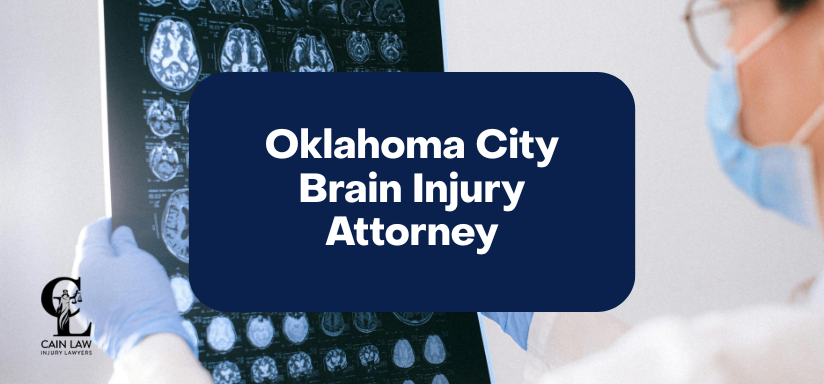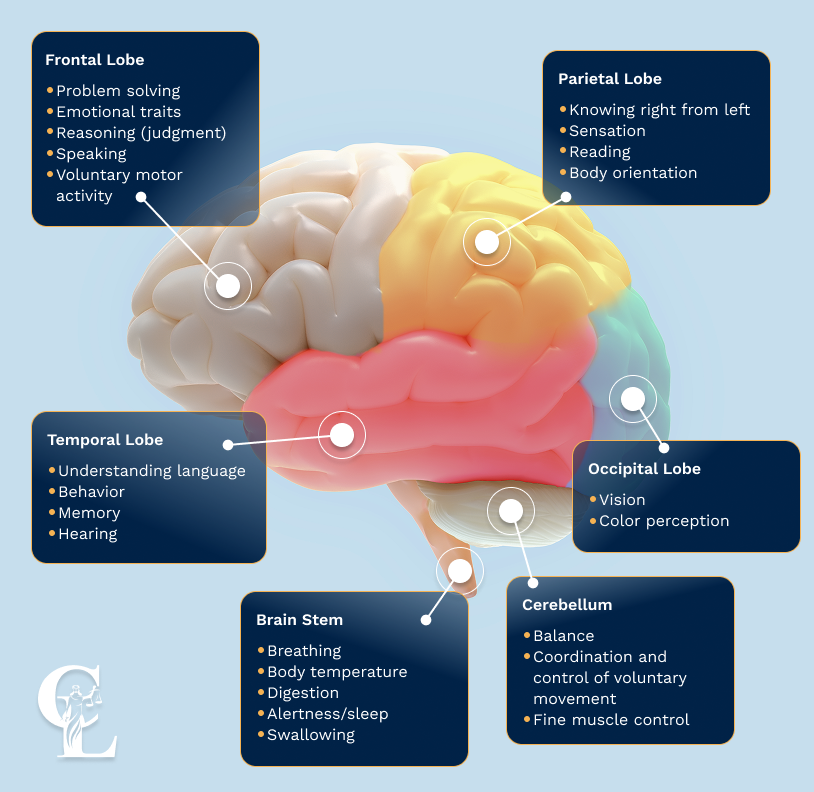
A traumatic brain injury can result in prolonged or permanent disabilities or impairments that adversely affect a person’s life and significantly alter the lives of the loved ones who care for them. If you’ve suffered a brain injury due to someone else’s fault, experienced legal representation can help you seek financial compensation from the party who caused the injury.
Contact local Oklahoma law firm Cain Law today for a free initial case evaluation with an experienced and knowledgeable traumatic brain injury attorney to discuss your legal options.
Why Hire Cain Law to Help with Your Traumatic Brain Injury Claim
When you’ve suffered a life-altering TBI in an accident, choosing the right legal counsel can make a difference in the outcome of your brain injury claims and the monetary compensation you recover for your expenses or losses. Over the years, injured clients have turned to Cain Law for help pursuing financial recovery and justice after devastating injuries.
Our Oklahoma brain injury attorneys will ensure that your case receives:
- Extensive Experience – Our personal injury lawyers have over 100 years of combined legal experience. We have handled many brain injury cases and know what it takes to build the most robust claims. We hire trial consultants and use focus groups to tailor our legal strategy to each case. We also use demonstrative evidence and the latest technology to enhance your case.
- Recognition as Leaders in the Field – Monty Cain and our other TBI lawyers teach other lawyers in Oklahoma and nationally how to handle TBI cases. We are recognized leaders in this area and have a network of local and national experts we can call upon to provide additional support for your brain injury case.
- Personalized Attention – We have worked firsthand with brain injury victims and understand the dramatic impact these injuries can have on you and your family. We maintain a caring and friendly atmosphere so you feel comfortable talking to us about your needs, concerns, and goals. We treat every client who walks through our doors like family. We are also knowledgeable about the latest treatment and diagnostic options and can refer you to providers who can deliver the quality care you deserve.
- Dedication to Getting You Results – Our law firm has secured over $80 million for our clients in verdicts and settlements. We are prepared to fight tirelessly to secure maximum compensation for you and your family.
At Cain Law, we know that a case begins on the day of the accident. As soon as you call us, we can deploy our rapid response team to the accident scene to preserve evidence and complete inspections. We send spoliation of evidence letters to adverse parties so valuable evidence doesn’t get lost or destroyed. We obtain witness statements to support your claim.
Oklahoma brain injury attorney Monty Cain and the Cain Law team take the time to thoroughly investigate your case to identify your legal options. We’ll explain your rights in an honest and easy-to-understand manner so you can make informed decisions.
Let us provide the support you need to put your life back together after suffering a catastrophic brain injury. We have extensive experience handling brain injury lawsuits and other types of personal injury claims. We can explain more about how we can help when you contact us for a free consultation.
How an Experienced OKC Brain Injury Lawyer from Cain Law Office Can Help
A traumatic brain injury can result in lifelong impairments. The last thing you or your family member should have to worry about is how to pay for the long-term care you’ll need. At Cain Law, our Oklahoma traumatic brain injury lawyers put you and your family first, prioritizing your needs and building a comprehensive case that offers you the best chance at recovering maximum compensation.
To date, we’ve recovered over $80 million in verdicts and settlements for our clients and are always willing to come to where you need us, whether that is your home or a hospital room. From start to finish, you can count on our team to go above and beyond to help you get the care and compensation you deserve. Our TBI lawyers will:
- Immediately launch an in-depth investigation into the cause of the accident
- Identify all potentially liable parties
- Manage communication between you and all associated parties
- Help you find the medical care and experts you need
- Build a comprehensive legal strategy
- Negotiate for maximum compensation for your injuries
- Prepare a case for trial when necessary
At Cain Law, we have the experience and resources to make a difference in your case, and our clients agree.
Former client Lane Chandler says, “Cain Law and Anthony Alfonso were incredible to work with. I would recommend them every time.”
“I had the pleasure of working with Anthony Alfonso, and I’m so happy I did it. He and his law team were amazing. They helped me to understand every step and process in my injury and accident claim. I strongly recommend working with him if you don’t want to deal with or get stressed out by insurance company claims. He is the best of the best! If there were more than 5 stars, he would deserve it as well,” says client Katherine Devoto.
At Cain Law, we are prepared to handle your TBI claim and help you navigate this challenging time compassionately.
What Is a Traumatic Brain Injury?
According to the National Institute of Neurological Disorders and Stroke, traumatic brain injuries (TBI) often occur when there is a sudden and shocking blow to the head. A TBI can also occur when the skull is pierced by an object that penetrates brain tissue. Additionally, TBIs can happen due to violent movement of the head forward and backward, such as during whiplash in a car accident, when there is no impact with another object other than the skull. This type of violent shaking causes a coup-contrecoup injury caused by the brain striking the front and back of the skull and twisting inside it. This happens because the brain is free-floating in fluid inside the skull. Each type of brain injury is very serious and has the potential to alter the rest of your life.
Common Types of Traumatic Brain Injuries
A traumatic brain injury is an injury that affects normal brain function. Brain injuries are divided into two general groups:
- Open-head injuries occur when the skull breaks open or an object penetrates through the skull and enters brain tissue.
- Closed-head injuries refer to traumatic brain injuries that occur without the skull breaking. Twisting forces on brain tissues or blunt force trauma caused by the brain hitting the inside of the skull results in physical damage to the brain.
Following an accident, any brain injury or suspected brain injury should be taken seriously and requires immediate medical care.
At Cain Law, our Oklahoma brain injury lawyers help clients recover from all types of traumatic brain injuries sustained in accidents caused by others’ negligence or fault, including:
- Focal Injuries – Focal injuries involve direct blows to the head. They cause contusions or lacerations.
- Coup-Countrecoup Injuries – These are two separate brain injuries that occur during the same event, typically on opposite sides of the brain. The coup injury occurs at the site of impact, while the contrecoup injury occurs on the opposite area of impact.
- Skull Fractures – Skull fractures can damage brain tissues when bone fragments penetrate the brain.
- Intracranial Hematomas – Brain injuries can lead to an intracranial hematoma or a buildup of blood between the inside of the skull and the brain’s surface or within the brain itself.
- Diffuse Axonal Injuries – A diffuse axonal injury occurs when twisting forces of the brain shear and sever the connections between nerve cells, called axons. These serious brain injuries can result in coma.
Traumatic brain injuries are categorized by their severity: mild, moderate, and severe. These classifications are as follows:
- Mild – Mild traumatic brain injuries, frequently referred to as concussions, can cause temporary changes in cognitive function that resolve in a few days or weeks. However, repeated mild concussions can cause permanent damage, leading to chronic conditions like dementia pugilistica or chronic traumatic encephalopathy (CTE). These conditions are most often seen in athletes who played contact sports.
- Moderate – Moderate traumatic brain injuries almost always require immediate medical attention to prevent aggravation of the injury or to repair damage to the skull or brain.
- Severe – Severe brain injuries can result in permanent disability or potentially fatal consequences, such as severe physical and cognitive impairment or a persistent vegetative state.
If you or a loved one recently suffered a TBI or brain damage after an accident, contact our experienced traumatic brain injury attorneys for legal guidance.
Common Symptoms and Signs of a TBI
A traumatic brain injury can cause a variety of symptoms depending on the type and severity of the injury. Brain injury victims may begin displaying signs of an injury immediately after an accident or traumatic blow to the head or body, or symptoms may take days to appear.
Brain injuries can impact various aspects of a person’s body and functioning. Various symptoms may include:
Mild TBI Symptoms
The physical, cognitive, and sensory symptoms associated with mild TBIs include:
Physical Symptoms
Common physical signs of a mild traumatic brain injury include:
- Headaches
- Nausea and vomiting
- Fatigue or drowsiness
- Speech issues
- Dizziness or balance issues
- Vertigo
- Lightheadedness
- Slowed reaction time
Cognitive Symptoms
Common cognitive signs of a mild TBI include:
- Brief loss of consciousness
- Feeling confused, dazed, or disoriented
- Memory and concentration problems
- Mood changes or swings
- New feelings of depression or anxiety
- Difficulty sleeping or sleeping more than normal
- Reading difficulty
- Restlessness
Sensory Symptoms
Common sensory signs of a mild TBI include:
- Blurred, limited, or double vision
- Ringing in the ears
- A bad taste in the mouth or loss of taste
- Changes to smell
- Sensitivity to light or sound
Moderate to Severe TBI Symptoms
Moderate to severe traumatic brain injuries have some symptoms that are similar to those resulting from mild TBIs, as well as some unique symptoms.
Physical Symptoms
Physical signs of moderate to severe TBIs include:
- Loss of consciousness lasting several minutes to several hours
- Persistent or worsening headaches
- Persistent nausea or vomiting
- Convulsions or seizures
- Dilated pupils
- Clear fluids draining from the ears or nose
- Inability to wake up from sleep
- Weakness or numbness in fingers or toes
- Balance or coordination issues
Cognitive Symptoms
Cognitive signs of moderate to severe TBIs include:
- Severe confusion
- Agitation, combativeness, or other unusual behavior changes
- Slurred speech
If you notice any of these symptoms, seek medical attention immediately. Then, contact our law firm to learn about your legal options for financial recovery.
Types of Injuries Associated with Brain Injuries

Brain injuries can result in injuries to other parts of the body. For example, brain injuries sometimes cause pituitary gland injuries (a growth hormone). Injuries to it can develop years after the initial TBI. The National Institutes of Health reports that chronic anterior pituitary deficiencies occur in 15% to 60% of adults after a TBI and up to 42% of children and adolescents. Some TBI victims may regain functional abilities, or the pituitary deficiency can resolve, one to three years after the injury.
Brain injuries can also cause eye injuries, such as occipital nerve injuries. An occipital nerve is located on each side of the head. The two nerves move through muscles at the back of the head and into the scalp from the spinal bones in the upper neck. Injuries to occipital nerves can occur due to trauma to the neck or back of the head. Many people confuse these injuries with migraines, but they can be debilitating and drastically reduce your quality of life.
Common Causes of Oklahoma Traumatic Brain Injuries
The brain can become injured any time something hits the head, the head hits another object, or the brain collides with the skull’s interior.
The most common causes of head injuries include:
- Slip and fall accidents – Falls are the leading cause of TBIs, responsible for 28% of all TBIs. When people slip on dangerous property, they often fall to the ground and hit their heads. This head trauma can result in brain injuries such as concussions.
- Car accidents – Motor vehicle accidents are responsible for 20% of all TBIs. There are many points of contact where accident victims can hit their heads during a car crash, including the dashboard, windows, and pavement. Loose objects in the car and broken glass can also cause penetration injuries.
- Trucking accidents – Trucking accidents are some of the worst on Oklahoma’s roads. Accident victims can suffer traumatic brain injuries in a truck accident. The severity of injuries after a trucking accident is typically far greater than in a car accident due to the disparity in the size and weight of the vehicles involved.
- Pedestrian accidents – Pedestrians have little protection when a motor vehicle crashes into them. They may hit their head on the vehicle or the ground. They could also suffer penetrating injuries from broken glass.
- Motorcycle/bicycle accidents – A motorcycle or bicycle helmet is not always enough to protect a biker’s head in the event of a crash. When cars crash into motorcycles or bike riders, serious brain injuries are common.
- Workplace/construction site accidents – Being hit by or colliding with an object is responsible for 19% of TBIs. Some workplaces are very dangerous. Workers on construction sites can fall from a height, become caught in equipment, or suffer other injuries that result in a serious injury to the brain. While construction sites are particularly hazardous work areas, no one is immune to accidents on the job.
Assaults are responsible for 11% of TBIs, and 12% have other causes.
When a severe head injury results from any of these incidents, an Oklahoma City brain injury lawyer can help accident victims pursue the compensation they need to recover.
How Oklahoma Brain Injuries are Diagnosed
The first step to your recovery is receiving an accurate diagnosis. Mild TBIs are incredibly underdiagnosed. According to the Brain Injury Association of America, between 56% and 80% of mild TBI cases are not detected in the emergency room.
The diagnosis process typically begins with a clinical diagnosis. A healthcare professional takes the patient’s medical history, conducts a physical examination, completes a neurological exam, and orders additional imaging tests, such as:
- CT
- DTI MRI
- Neuroquant MRI
- PET Scan
- SPECT Scan
- EEG
- Susceptibility Weighted Imaging
- Olfactory Testing
- Sleep Study
- Reflex Study
- I-Stat (Blood Test)
- Heart Rate Variability Testing
- TOB (Test of Balance)
- Neuro-Opthalmogical Testing
- VNG (Videonystagmography)
- Audiology Exam
- Hormone Testing
Cain Law can connect you with local medical providers to ensure your brain injury is promptly and properly diagnosed and treated.
Treatment for TBI
Treatment for traumatic brain injuries typically depends on the severity of the injury. It can sometimes be difficult for brain injury victims to find resources for mild TBI cases. Many of these cases are not properly diagnosed or treated. Cain Law can connect you with doctors who can properly diagnose your TBI. Doctors and family members should monitor a person who has suffered a mild TBI for persistent or worsening symptoms, which might indicate a more severe injury. Anyone who experiences even a mild TBI should seek medical attention as soon as possible.
Moderate to severe brain injuries require immediate medical attention. Emergency care for a severe TBI focuses on maintaining the flow of blood and oxygen to the brain and preventing further injury to the head or neck. Someone who has sustained a severe brain injury may receive anti-seizure medications, diuretics to reduce brain swelling, or drugs to induce a coma while the brain heals. Brain injury victims may also undergo surgery to fix skull fractures, remove debris from the cranium, repair broken blood vessels, remove blood clots, or open a window in the skull to relieve pressure on a swollen brain.
Long-term, a person who sustained a moderate to severe traumatic brain injury will undergo rehabilitation that may include physical, occupational, and speech therapy, recreational therapy, and vocational counseling. Brain injury victims may also require mental health care or psychotherapy to cope with depression, anxiety, or other behavioral and emotional changes.
An entire team of medical providers is often necessary to treat the far-reaching effects of brain injuries.
Our head injury attorney may include the following:
- Neurologists
- Neuropsychologists
- Psychiatrists
- Occupational therapists
- Speech therapists
- Physical therapists
- Recreational therapists
- Neuro optometrists
- Counselors
- Cognitive therapists
- Endocrinologists
Our locally- and nationally-recognized brain injury team can connect you with leading providers.
Evaluations by Experts
To receive the best care, you or your child may need to be evaluated by various experts, including:
- Neurologists
- Brain injury specialists
- Neuroradiologists
- Neurooptometrists
- Brain injury psychiatrists
- Neuropsychologists
- Pediatric neurologists and neuropsychologists
- Audiologists
- Endocrinologists
Each of these medical professionals specializes in different types of treatment. Evaluations by multiple experts can ensure you are treated holistically.
Cain Law can also help connect you with experts who can explain how the accident happened (biomechanical experts) and how your injuries affect your earning capacity and livelihood (vocational experts). We also work with life care planners who can explain the full impact of the brain injury on your life and vocational experts who can develop effective Individual Educational Plan (IEP) and 504 plans to help your child’s education after a brain injury.
our top priority
Long-Term and Permanent Effects of a Traumatic Brain Injury
According to Cornell University, approximately 1.7 million Americans sustain a traumatic brain injury each year. 52,000 people die from these injuries, while 275,000 people are hospitalized, and another 800,000 receive outpatient care for TBIs. Approximately 80,000 to 90,000 TBI cases each year result in long-term disabilities.
Unfortunately, traumatic brain injuries can have long-term effects or complications. Even repeated mild brain injuries can result in permanent damage or changes. However, severe injuries increase the risk of more extensive and severe complications.
Research published in the Journal of Neurology reports that TBI can accelerate the age of onset of cognitive impairment by two or more years. The Alzheimer’s Association reports that a TBI results in a four- to six-time increase in the risk of dementia diagnosis. Additionally, TBI results in the progressive loss of brain tissue volume, which continues for many years, according to research published by the National Institutes of Health.
Other long-term effects that a traumatic brain injury may cause include:
- Consciousness disorders, including coma and brain death
- Physical complications, including seizures, headaches, infections, movement disorders, cardiovascular disease, vertigo, and the buildup of fluid in the brain
- Cranial nerve damage, which can cause facial paralysis, sensory changes, and trouble swallowing
- Intellectual challenges, including cognitive and memory impairments
- Communication challenges, including difficulty with spoken and written language and difficulty processing social cues
- Behavioral changes, including impulse control problems, risk-taking behavior, and verbal or physical outbursts
- Emotional changes, including depression, anxiety, mood swings, irritability, and trauma-induced ADHD
- Increased risk of degenerative brain diseases like Alzheimer’s disease, Parkinson’s disease, or chronic traumatic encephalopathy (CTE)
Many brain injury victims notice that their personal relationships with loved ones also change.
Damages Available in an Oklahoma TBI Claim
Depending on the severity of a brain injury, an accident victim may face a lifetime of expenses associated with their care. Traumatic brain injuries can cause prolonged or permanent disabilities, which can place significant financial and emotional burdens on an injury victim and their family, especially when family members must devote time to helping them with daily tasks.
Calculating the value of a traumatic brain injury can be challenging. A brain injury can lead to lifelong physical, emotional, and mental impairments that may require long-term medical treatment and home care. A TBI may also significantly impact a person’s ability to return to work in the same capacity as before the accident, or their ability to work at all.
Although the severity of the injury and other factors can affect the overall value of a claim, many TBI accident victims can pursue compensation for:
- Current and future medical expenses, including rehabilitation costs, emergency medical treatment, and physical therapy
- Lost wages and loss of future earning capacity
- Property damage, for any personal property damaged in the accident
- Long-term disability care costs, including home modifications and home health services
- Loss of enjoyment and quality of life
- Pain and suffering, including physical and emotional pain and suffering
The challenges that accompany a traumatic brain injury claim make it essential to work with an experienced TBI lawyer before accepting any settlement or compensation from an insurer.
What to Do if You or a Loved One Suffers a Traumatic Brain Injury
Unfortunately, the signs of some traumatic brain injuries can take time to manifest fully. If you or a loved one has been involved in an accident and you suspect head trauma, seek medical attention immediately. The sooner you seek diagnosis and treatment, the sooner a medical professional can assess the situation and provide proper treatment and care.
Family members may also find it challenging to cope with a TBI diagnosis. Physical, mental, and personality changes in a TBI patient can take a toll on loved ones. Take time to seek counseling or mental health services or support groups that can help you prepare for helping a loved one navigate a TBI diagnosis.
As soon as possible, contact an experienced TBI lawyer for assistance. The road ahead is difficult, but the entire legal team at Cain Law can help you.
Time Limit for Filing a Brain Injury Claim
Under Oklahoma’s statute of limitations on personal injury claims, you typically have two years to file a lawsuit after suffering a brain injury in an accident caused by another party’s negligence, recklessness, or fault. However, if you sustain a brain injury in a physical assault, the statute of limitations gives you one year to file your lawsuit.
Furthermore, suppose you have a brain injury claim against the state or local government in Oklahoma. In that case, the law requires you to provide the appropriate government department or agency with notice of your brain injury claim within one year of the date of your injury.
Don’t wait to talk to a brain injury lawyer from Cain Law about starting your claim. If you file your claims after the applicable deadlines expire, you may lose your right to seek financial recovery from those responsible for your injuries.

